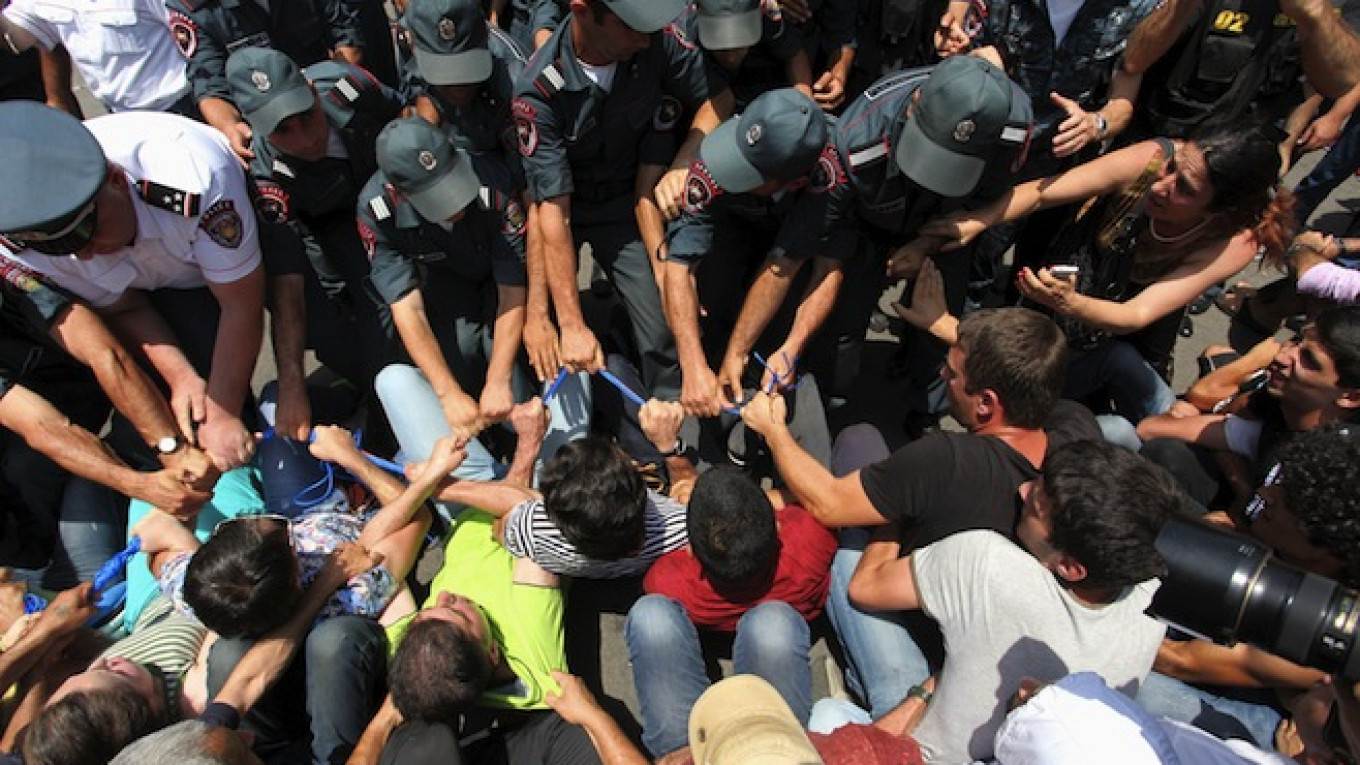Originally published by EurasiaNet.org.
The Electric Yerevan protest in the Armenian capital did not manage to attain the critical mass needed to transform into a Euromaidan-type event, leading to an overhaul of the country’s political system. But local analysts believe that Electric Yerevan will nevertheless prompt changes in government policy.
Police showed restraint while clearing Yerevan’s central Baghramian Avenue of protesters on July 6. The protest had erupted nearly two weeks earlier over announced plans by the Russian-owned Electric Networks of Armenia to impose a massive rate increase.
Brought together by discontent over the intended rate hike, the protesters never articulated clear political demands, nor developed a concrete action plan. As the days passed, the number of protesters in the streets dwindled. When police took action on July 6 to remove the barricades, after protesters had pledged to move them slowly toward the presidential residence, resistance was minimal.
In contrast to an earlier effort by authorities to break up the protest, police took individuals into custody peacefully on July 6, with some heard saying: “Be careful! They are our sisters and brothers.” The 46 detained on July 6 were quickly released from custody, along with 240 individuals detained on June 23.
Some civil society activists in Yerevan, including Cooperation for Democracy Center chairman Stepan Danielyan, said the fact that the protesters held their ground for so long represented a political victory, sending a signal to authorities that they would be held accountable for their actions.
“Definitely, the youth won. They kept the street closed for 13 days, the government did not dare to open up the avenue, and that was definitely a victory,” Danielyan said.
Political analyst Aghasi Yenokyan, director of Yerevan’s Armenian Center of Political and International Relations, expressed a more cautious view when speculating about the protest’s potential legacy.
“It is hard to say who the winner was in this fight,” Yenokyan said. “Definitely, Baghramian Avenue [the protesters] could dictate its will, and the government was able to pursue something from Russia, and serious processes have been launched by this fight.”
While the longer-term impact of the protest may be open to debate, it is clear that it had an immediate impact in several areas of public concern. For one, the Armenian government is pledging to cover the increase in electricity prices itself and to have auditors review the company’s operations. Already, regulators have announced a 75 million dram fine ($158,412). Russia also is agreeing to convene an intergovernmental commission to review the company’s transactions.
More significantly, in an apparent bid to curry public favor, it agreed that a Russian soldier, Private Valery Permyakov, charged with the murder of an entire family in the northern city of Gyumri, the site of additional protests, will be tried by an Armenian court, instead of a Russian military tribunal.
When considering the longer term, the protest showed that authorities cannot act with a sense of impunity. “They [officials] have to consider public opinion,” said Artur Sakunts, director of the Vanadzor office of the Helsinki Citizens’ Assembly, a human rights organization.
“Events in Baghramian Avenue were a lesson for our authorities, and they realized that Armenian society is unpredictable,” added Sakunts.
Others appear to have that impression as well. Already, the country’s water distribution network has scrapped plans for a 1.4 percent price increase.
Aside from the Armenian government, Russian media outlets made it plain that the Kremlin “felt the danger” of meeting “tete-a-tete with Armenian society,” Sakunts noted.
Mainstream Russian media outlets characterized the demonstration as a potential repeat of Ukraine’s 2013-14 Euromaidan revolution in Ukraine. Some senior Russian politicians attributed the protest to an alleged American conspiracy.
From the start, activists in Yerevan bristled at comparisons between the Electric Yerevan protest and Euromaidan. Many in Yerevan claimed that their fight was not “against Russia,” but rather “for the sake of Armenia” and was far removed from politics.
On July 2, whistles and criticism met one former Soviet dissident, 65-year-old Paruyr Hayrikyan, leader of the National Self-Determination Union, when he came carrying European Union flags to Baghramian Avenue.
The fact that political parties had no influence on the protest prevented it from turning into a Euromaidan, analyst Aghasi Yenokyan asserted. He attributed the protesters’ dislike of the Euromaidan label to Russian media influence and Russian propaganda.
Danielyan, however, believes the protest is a starting point. “The movement has all the potential to [take a] step back for a while and return in a new, more powerful and more professional manner to solve the problem and become more powerful,” he said.
The group that launched the Electric Yerevan protest, No to Plunder, has set July 14 as the day for a planned march on the Prosecutor’s Office.
Originally published by EurasiaNet.org.
A Message from The Moscow Times:
Dear readers,
We are facing unprecedented challenges. Russia's Prosecutor General's Office has designated The Moscow Times as an "undesirable" organization, criminalizing our work and putting our staff at risk of prosecution. This follows our earlier unjust labeling as a "foreign agent."
These actions are direct attempts to silence independent journalism in Russia. The authorities claim our work "discredits the decisions of the Russian leadership." We see things differently: we strive to provide accurate, unbiased reporting on Russia.
We, the journalists of The Moscow Times, refuse to be silenced. But to continue our work, we need your help.
Your support, no matter how small, makes a world of difference. If you can, please support us monthly starting from just $2. It's quick to set up, and every contribution makes a significant impact.
By supporting The Moscow Times, you're defending open, independent journalism in the face of repression. Thank you for standing with us.
Remind me later.






